Georgia: Evangelicals, minority voters and a crowded ballot
Trump and Harris are neck and neck in a state that Biden won narrowly in 2020. The key to victory in such a close race could lie in minority voters and how many votes support third-party candidates on November 5
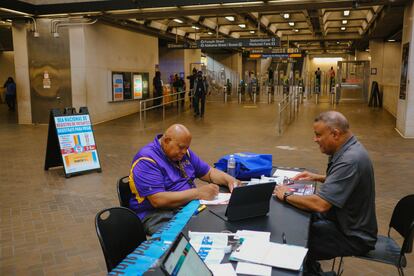

Jimmy Nolen walks into a store in Rome, Georgia with a large box under his arm. Inside it is one of the 70-year-old’s most valuable possessions. It’s a beaver skin cowboy that he’s had for decades. Nolan — who describes himself as a modern cowboy — brought the hat to get it cleaned and the brim smoothed in the hope of passing it on to one of his grandsons. They are currently nine and 14 years old, and are with Nolen today so that their grandpa can buy them their first pair of cowboy boots.
“There is no better footwear than this. I never take mine off,” says Nolen, who nonetheless, has opted for a pair of comfortable sandals on this particular morning.
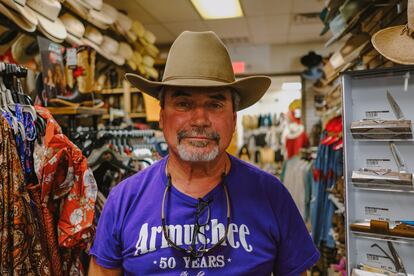
Nolen, with his weathered skin and penetrating blue eyes, is one of Donald Trump’s supporters in Georgia, a southern state of 10 million inhabitants that four years ago, was narrowly decided in favor of Joe Biden, the first Democrat to win the state since Bill Clinton in 1992. Today, it is one of the seven swing states that Kamala Harris and Trump are fighting to sway ahead of the November 5 presidential election. The former Republican president is charged with election subversion in Georgia over his efforts to reverse his 2020 defeat. A date for trial has yet to be set.
The retired cowboy was employed by the iron industry for 20 years and afterwards, worked in sales for various companies, including Dow Chemical. Today, he lives on a farm in Rome, a town of less than 40,000 people located in the heart of the 14th congressional district, region that sent the radical Marjorie Taylor Greene to Washington. She is one of the star lawmakers of the MAGA movement. Biden won his race in Geogia by less than 12,000 votes, but lost Rome’s Floyd County by 40 points.
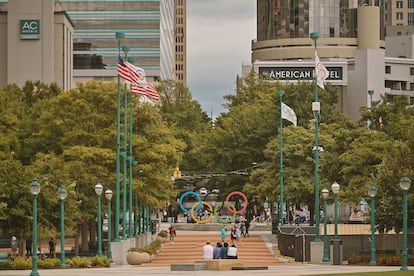
“We’re good people in the south, but when we are betrayed, there’s no going back,” says Nolen. The last Democratic voter in his family was his grandfather. Younger generations have all supported conservative candidates. No one’s changing his mind on the issue. “When I run into a Democrat, I make like I’m listening, but I’m really not paying much attention, because I don’t like their ideas,” he says. He complains about how everything has gotten more expensive, blaming people who’ve come from other states, like California. “Before, it was very rare to see Hispanics around here. Now, they’re everywhere,” he says. “My kids say the same thing: two-thirds at the school are Latinos,” offers the salesclerk. “If not more,” says Nolen, dusting off his hat.
The area where he lives, which is to the north of Atlanta and close to the Tennessee border, is full of Civil War history. The Confederate flag still proudly hangs from some porches. A few miles away in the town of Resaca, there’s a cemetery with the graves of 400 Confederate soldiers who were felled in 1864 during two days of battle that served as the prologue to the capture of Atlanta by Union troops. The site is an obligatory stop for student groups in the area.
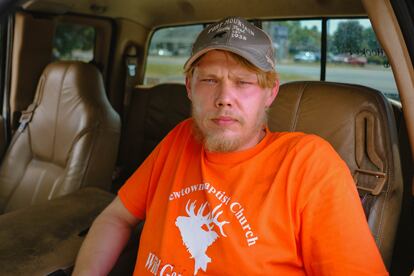
Many have started to feel the squeeze from rural Georgia’s economic situation. Cody Lance, 24, came to the town of Calhoun to pawn his gun for $300 at a store. “In the street, they would have given me at least $800, but I wouldn’t want it to be used for something bad. Also, I like to think I’m not getting rid of it. I can come get it back,” he says. He has two other weapons at home.
Lance is a small business owner from Dalton, a town that recently made national headlines thanks to yet another school shooting. “I think that everyone has the right to carry a gun up to a certain point. Not within schools or churches, but it’s good to have it in your car, because you never know when someone’s going to start shooting,” he says. His started his career transporting cargo in his pick-up truck throughout Georgia, Tennessee and Louisiana. Nowadays, he drives a bigger truck, but business has declined. He’ll use the money from the gun to buy food and gas for a week.

Dressed in a T-shirt from the Newtown evangelical church, Lance admits he voted for Trump four years ago, in what was his first time voting in aa presidential election. Today, he’s not convinced he’ll vote again. “[Trump] has been attacking Harris all the time. He shouldn’t be doing that. He should talk more about what he’ll do and when he’ll do it, instead of diminshing her,” he says.
The evangelical vote
The evangelicals are one of the primary motors of the Republican Party in Georgia. Ralph Reed, an ultra-conservative activist, said recently in Atlanta that an army of volunteers knocked the doors of 280,000 potential voters to motivate them to get out and vote. Reed heads up the Faith and Freedom Coalition, which looks to protect Republican Governor Brian Kemp’s 2019 abortion ban that banned the procedure once a fetus’ heartbeat can be detected. The law was approved by a Republican majority before Roe v. Wade, the landmark ruling that established the federal right to abortion, was overturned.

“It’s time for Christian voters to be the head and not the tail of our political system,” said Reed, who founded his organization in 2009 to serve as a bridge between evangelical voters and the Tea Party, which was on the rise at the time. The coalition is distributing voter’s guides to promote Trump among anti-abortionists at 5,000 churches around Georgia.
“Some 160,000 voters from the movement who believe in the Bible voted for Trump in 2016 and in 2020, they didn’t bother to turn out,” said Reed. His marquee guest was Ohio Senator J.D. Vance, Trump’s running mate, whose selection to the ticket underlined the Republican’s commitment to the Bible Belt.
“I know many here are concerned that traditional conservatives are no longer welcome in the Republican Party. That is false,” Vance said.

“Human life is precious and should be protected, because we believe that every child, born and unborn, is created in the image of God,” said Vance at the Faith and Freedom Coalition on September 16. His words were an attempt to calm evangelicals after Trump softened his position on abortion, perhaps in the hope of stemming his declining support among women voters. “We want to invest in women, especially in pregnant women who need help bringing their children into the world. That can be scary when pregnancies are not planned,” added Vance, to the applause of the church members and Republican state functionaries.
Harris returned to Georgia last week to reinforce abortion as a central theme in her campaign. “One does not have to abandon their faith or deeply held beliefs to agree the government should not be telling a woman what to do with her body,” she said at an event in Atlanta on September 20.
The candidate brought up the fact that one out of every three women live in states that passed abortion bans after Roe v. Wade was overturned. All the southern states, with the exception of Virginia, have passed laws restricting the termination of pregnancies. “More than 20 states have Trump abortion bans […] In two states of those states, they provide for prison for life,” said Harris. “And these hypocrites want to start talking about ‘this is in the best interest of women and children.’ How dare they?”

The disrupters
Although the majority of voters lean towards Harris or Trump, the key to one of those candidates’ victory in Georgia could depend on lesser-known names, like that of Chase Oliver. At 38 years old, the gay politician is the youngest presidential candidate in the election. While the Democrat and the Republican are focusing the last days of the campaign on the seven swing states, Oliver, from the Libertarian Party, continues to travel throughout the country to events as eclectic as the Plano, Texas Balloon Festival.
“Many of my events focus on getting to know voters face to face to show them that there is an alternative to the party system,” says Oliver in a restaurant on the outskirts of Atlanta, where he lives and shares a house with three roommates: two cats and a dog.

Oliver — a salesperson with human resources experience — got his start in politics as an activist speaking out against the invasion of Iraq. He’s not fighting to get to the White House, but rather, to raise his party’s profile. The Libertarian Party was founded 50 years ago and its central philosophy is “get the government out of your life.” He says that the party has some things in common with both Democrats and conservatives, and that the Latin American leader who best reflects his ideals is Argentina’s Javier Milei.
On November 5, Oliver’s name will be on the ballot in 47 states. That’s especially worrisome for Harris in states like Georgia. Two years ago, he ran to be a U.S. senator, winning 81,000 votes or 2%, far from victory, but better than the 1% that was expected. His showing forced the vote to a runoff. “I forced a special election between Democrats and Republicans, and that attracted the party’s attention. Soon afterwards, they asked if I’d ever thought about running for president,” says Oliver.
A recent poll by The New York Times shows that the Libertarian has the support of 2% of voters at the national level, which is certainly high enough to impact results in his home state. Still, several analysts warn that third-party candidates get less votes on election day than polls predict. Oliver, who has spent $30,000 out of his own pocket on his campaign, sounds satisfied with his role as a “disruptor.”
“I’m trying to sufficiently affect the election for voters to wake up to the fact that they’re being presented a false binary choice and that in every other democracy in the world, there are more than two options,” he says.
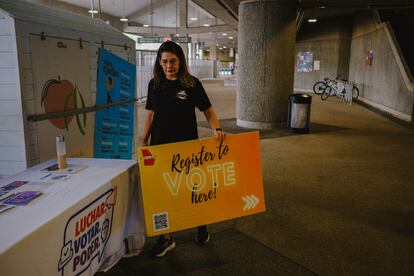
He’s not the only disruptor. The Democratic Party launched a legal offensive against other candidates to get them disqualified from the election and avoid states like Georgia having the most crowded ballot since 1948. “Throughout the country, the Democrats are spending an immense amount of money in employing an army of lawyers to displace our campaign. Harris is positioning herself as the only force that can save democracy from Donald Trump, but at the same time, she is attacking democracy to make sure that only Trump is with her on the ballot,” Claudia de la Cruz, Party for Socialism and Liberation candidate, tells EL PAÍS.
Cornel West, a Black philosopher and former Harvard professor, shares that view. “Us independents are going to vote for an independent. We are tired of supporting the lesser evil, which is an approach that will get you nowhere. There’s a large number of potential voters who are simply abstaining because they don’t matter, they feel like they are not being listened to nor taken into account,” says Fatimah Mustafah, a volunteer for West’s campaign in Georgia and disillusioned former Democratic voter. West’s and de la Cruz’s names will appear on some ballots, but it’s still unclear whether votes for them will be valid. That depends on court decisions that are expected to be delivered in the next few weeks, which could cause chaos for some campaigns.
Voter purge
To the beat of Not Like Us, Kendrick Lamar’s hit that has become one of the songs of the summer in the United States, teachers from the Atlanta Metropolitan State College try to attract students to a table, where four women are waiting to help them with voter registration, which ends on October 7. A festive atmosphere reigns. There are drinks, hot dogs and games. Even so, few approach to ask for information on the process. One was Jenesis Taylor, a 25-year-old student originally from Memphis, Tennessee, who will vote for the first time in November.
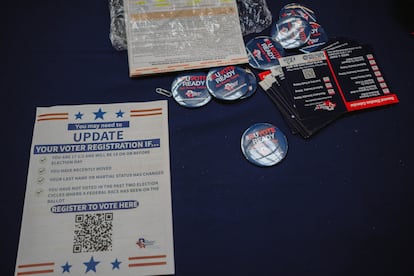
“People from my generation think they don’t have a voice that matters or that their actions can’t make a big impact on the future, so I think that some don’t take the time to understand politics or how it works,” says Taylor, who said she’d done that work and had decided on her vote after the debate between Trump and Harris. The student tries to warn her peers that there is a “voter purge” in Georgia that will affect, above all, people like her: young people of color.
“Over the past two years, the legislature has approved laws that make it more difficult to vote,” says Kayron Bearden, a volunteer for the League of Women Voters, a non-partisan organization that encourages participation. The Republican majority in the local Congress has adopted measures that place more obstacles to voting by mail and for absentee voters, arguing that better control is needed to avoid fraud.
This is in addition to decisions made by the State Election Board, which is controlled by three functionaries affiliated with Donald Trump. The organization recently decided to require a manual count of votes on election night in each of the state’s 159 counties. The measure — which has been widely criticized — will be performed in addition to an electronic tallying. Critics say that this will not only delay results, but also increase the potential for fraud, given that functionaries must open sealed ballots for the hand count. The Board has also evaluated measures that would allow for the presence of more partisan observers in the ballot processing centers. Some are considering asking for police support on November 5 and are even thinking about installing panic buttons within offices.
Sign up for our weekly newsletter to get more English-language news coverage from EL PAÍS USA Edition
Tu suscripción se está usando en otro dispositivo
¿Quieres añadir otro usuario a tu suscripción?
Si continúas leyendo en este dispositivo, no se podrá leer en el otro.
FlechaTu suscripción se está usando en otro dispositivo y solo puedes acceder a EL PAÍS desde un dispositivo a la vez.
Si quieres compartir tu cuenta, cambia tu suscripción a la modalidad Premium, así podrás añadir otro usuario. Cada uno accederá con su propia cuenta de email, lo que os permitirá personalizar vuestra experiencia en EL PAÍS.
¿Tienes una suscripción de empresa? Accede aquí para contratar más cuentas.
En el caso de no saber quién está usando tu cuenta, te recomendamos cambiar tu contraseña aquí.
Si decides continuar compartiendo tu cuenta, este mensaje se mostrará en tu dispositivo y en el de la otra persona que está usando tu cuenta de forma indefinida, afectando a tu experiencia de lectura. Puedes consultar aquí los términos y condiciones de la suscripción digital.








































